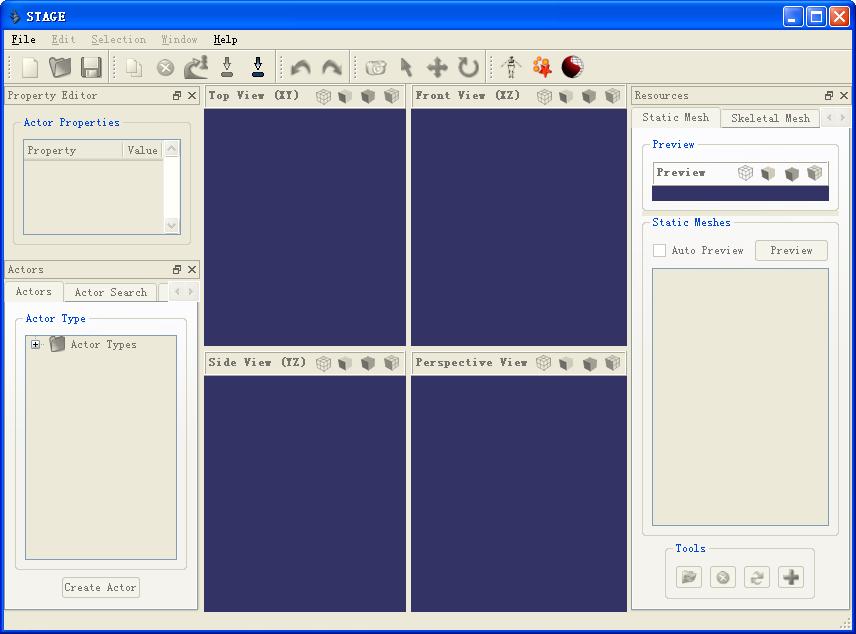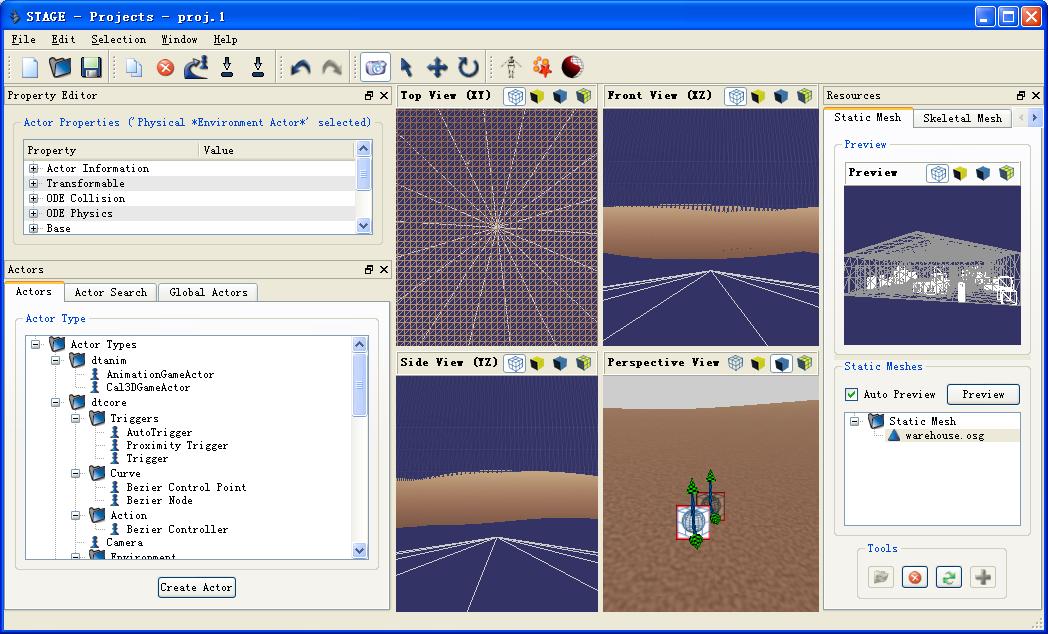转:Delta3D Editor编译成功
下载:
官网 www.delta3d.org 有些地方访问不了(试试这个代理:133.1.74.163 3128),我在公司就访问不了,但是住的地方就可以。但是sourceforge是可以访问的。
http://sourceforge.net/projects/delta3d/
源码: dt_win32_2.0.0.zip
依赖: dt_dep_vs8.0_xp_2.0.0.zip (xp上有编译好的第三方库,vista上就惨了,我的本本就装了个安装版的,只用来学习用法,没法调试)
设置:
1.把依赖文件解压到delta3d对应的文件夹里
2.设置环境变量:
DELTA_INC = %DELTA_ROOT%\inc;%DELTA_ROOT%\ext\inc;%DELTA_ROOT%\ext\inc\CEGUI
DELTA_LIB = %DELTA_ROOT%\lib;%DELTA_ROOT%\ext\lib
DELTA_DATA = %DELTA_ROOT%\data
And, of course, add %DELTA_ROOT%\bin;%DELTA_ROOT%\ext\bin to your PATH.
3.Qt的编译我就不说了。我机子上装的是4.3.0 commercial version.
编译:
打开delta3d\VisualStudio\utilities\STAGE\dtEditQt_2005.sln开始build吧!那个dtChar的error行注释掉好了。
注意:不要把代码放在移动硬盘上,否则可能会出问题,我遇到了,编译出来的exe一运行就报错。
截图:
File->Change Project 设定路径
########################################
# Delta3D: The Open-Source Game Engine #
########################################
Welcome to Delta3D ! We hope to get you up and running with Delta3D as
quickly as possible. If you only wish run pre-built applications and have
already used the Windows installer, you are ready to rock.
Go ahead and try out the examples by running the executables found in
the bin folder.
There are also several useful utitilies also found in the delta3d/bin folder.
See the readme.txt in delta3d/utilities for more details.
If you are a developer you'll want to build from the source
which we provide with all our distributions. Please follow instructions
in the below instructions to build the source.
Thanks for using Delta3D! Please visit our webpage at http://www.delta3d.org
and don't hesistate to use the forums for any problems you may have. We'll do
our best to respond as quick as possible.
Sincerely,
The Delta3D Team
########################
# Building From Source #
########################
Here's what we know does work:
Microsoft Windows XP w/ Microsoft Visual Studio .NET 2003 (7.1)
Microsoft Windows XP w/ Microsoft Visual Studio .NET 2005 (8.0)
Microsoft Windows XP w/ Microsoft Visual C++ Toolkit 2003, .NET Framework SDK 1.1, & SCons
Linux w/ gcc3.3.x
Linux w/ gcc3.4.x
Linux w/ gcc4.0.x
Linux w/ gcc4.1.x
Apple MacOS X 10.4 w/ the latest XCode tools
Note about Linux distrubutions: We test on Fedora Core 4 but have reports of
Delta3D running on Ubuntu, SuSE, Mandriva, & Gentoo. Please contact us if you
are able to setup repositories for any Linux distribution to ease installation
for other users.
################
# Dependencies #
################
See the Depedencies page on http://www.delta3d.org for more info on version compatibility.
If you are on Windows and are using VS2003 or VS2005, we have prepared dependency
pacakges for you. These will live as a folder called 'ext' that should live inside
your Delta3D directory. Check if you have the ext/ directory already in delta3d/.
If you do not have it, please download the latest version of delta3d-dependencies from
our SourceForge download site:
http://sourceforge.net/project/showfiles.php?group_id=113203&package_id=125151
and extract it into the Delta3D folder.
【重剑注:去上面的网址下载依赖文件解压到Delta3D对应的文件夹里】
If you are not using VS2003 or VS2005, you will need to either build the depedencies
yourself or track them down via your favorite package manager. So here's a handy list.
Required Libraries
------------------
CAL3D
CppUnit
Crazy Eddie's GUI System
FLTK
Game Networking Engine
GDAL
InterSense Interface Libraries SDK
HawkNL
OpenAL
FreeALUT
Open Dynamics Engine
OpenThreads
OpenSceneGraph
Producer
PLIB
ReplicantBody
Xerces-C
Linux only: Xxf88vm, uuid, ncurses.
Optional Libraries
------------------
Qt 4.x - Needed for STAGE.
Boost - Needed for Python bindings only.
Python - Needed for Python script support.
RTI 1.3 - Needed for HLA libraries, utilities, & examples.
#########################
# Environment Variables #
#########################
Delta3D requires environment variables at runtime (but not at compile-time).
The Windows installer will set these up for you, but if you use the zip
package or are on Linux you need to set them youself.
Microsoft Windows XP
--------------------
Make sure the Delta3D environment variables are set:
DELTA_ROOT = "C:\Program Files\delta3d" (or wherever Delta3D is installed)
DELTA_INC = %DELTA_ROOT%\inc;%DELTA_ROOT%\ext\inc;%DELTA_ROOT%\ext\inc\CEGUI
DELTA_LIB = %DELTA_ROOT%\lib;%DELTA_ROOT%\ext\lib
DELTA_DATA = %DELTA_ROOT%\data
And, of course, add %DELTA_ROOT%\bin;%DELTA_ROOT%\ext\bin to your PATH.
Once set, these variables can be used in Visual Studio in the project properties
or in the global VC++ directories (Tools->Options->Projects) as shown below:
Include files: $(DELTA_INC)
Library files: $(DELTA_LIB)
Linux
-----
DELTA_ROOT: path to your Delta3D installation
DELTA_DATA: $DELTA_ROOT/data
DELTA_INC: $DELTA_ROOT/inc:$DELTA_ROOT/ext/inc:$DELTA_ROOT/ext/inc:$DELTA_ROOT/ext/inc/CEGUI
DELTA_LIB: $DELTA_ROOT/lib:$DELTA_ROOT/ext/lib:$DELTA_ROOT/ext/lib/osgPlugins
LD_LIBRARY_PATH=$LD_LIBRARY_PATH:$DELTA_LIB
########################################
# Platform-specific build instructions #
########################################
Windows with Visual Studio 2005
-------------------------------
1. Make sure you have your depedencies setup (see above).
2. Open VisualStudio/delta_2005.sln, build! This will generate the essential Delta3D
libraries that can be built with our distributed dependencies.
3. The rest of the components can be build with project files of
the individual componets.
(dependencies that we do not distribute are listed in parentheses):
VisualStudio/src/dtHLAGM/dthlagm.sln : HLA library (RTI)
VisualStudio/src/dtScript/dtscript.sln : library to run python scripts (Python)
VisualStudio/src/python/dtpython.sln : python bindings (Python, Boost.Python)
Or just build EVERYTHING (make sure you have Python, BoostPython, RTI):
VisualStudio/delta_all_2005.sln
dtHLAGM
-----
Requries RTI package to be installed! We cannot distribute RTI with
Delta3D, so you are on your own. The dtHLAGM module is compiled and tested
against RTI-S 1.3_D18 although any RTI supporting spec 1.3 should work.
To build the module dtHLAGM,
you must add your RTI include and lib paths to the project settings or to
your global search directories using :
Tools->Options->Projects->VC++ Directories
Also, in order to run the unit tests, you must add the directory containing
your RTI DLLs to the VC++ directory for executable files.
VS solutions are provided for these apps in the delta_all_2005.sln.
The Python Bindings
-------------------
Building the Delta3D Python bindings requires the following additional
packages: Python and Boost.Python.
1. First let's install Python from: http://www.python.org/
2. Next, check if the following environement variables are set:
PYTHON_ROOT : directory of Python installation
PYTHON_LIB_PATH : %PYTHON_ROOT%/libs
PYTHON_VERSION : version of your Python installation
2. Ok, that was easy :) Now the hard part: installing Boost. Feel
free to cross-reference with their "Getting Started" guide:
http://www.boost.org/more/getting_started.html
Obtain the Boost library from SourceForge (package 'boost'):
http://sourceforge.net/projects/boost/
3. Unzip Boost. The directory will look something like "boost_1_34_1"
4. Obtain the Boost-Jam executable from SourceForge (package 'boost-jam')
5. Unzip Boost-Jam ('bjam.exe') and place it somewhere in your PATH or
into your Boost directory
6. Open a cmd shell and navigate to your Boost directory.
7. Run 'bjam stage --with-python'. This will build the Boost.Python set of
Boost libraries to a directory something like "boost*/stage/lib". Make sure to add this directory
to your PATH environment variable so Windows can find the Boost.Python DLLs
at runtime.
8. If you are using the Windows installer or have the dependency package unzipped
make sure to remove the Boost.Python DLLs contained in delta3d\ext\bin before
going any further. Otherwise, they will conflict with the DLL you just built.
9. Open a solution contain the project files for the Delta3D Python bindings:
-delta3d\VisualStudio\src\python\dtpython.sln or
-delta3d\VisualStudio\delta_all.sln.
10. Before building...
-Select Tools->Options
-Select the Projects folder
-Select VC++ Directories
-Change 'Show directories for:' to Include files
-Add your Boost directory to the list
-Change 'Show directories for:' to Library files
-Add 'boost_*\stage\lib' (or whatever your proper path is)to the list
11. Build!
12. Make sure the .pyd libraries were built into delta3d\bin. If not, rinse and repeat.
13. Set your PYTHONPATH environement variable contains the directory with the resulting
.pyd libraries (most likely delta3d\bin).
STAGE
-----
You'll need:
-Visual Studio .NET 2005
-Qt 4.x, the windows open-source release (http://www.trolltech.com)
Building Qt 4.x Open Source Version with MSVC
-----------------------------------------------
1. To configure Qt, just use the Visual Studio Command prompt, change
directory to where Qt is, and type "configure -platform win32-msvc2005". To see
the list of supported compilers, see the folder "mkspecs" in the Qt installation.
2. Once that is finished type "nmake" to start the compiling. If you just want
to build the libraries (much faster), type "nmake sub-src".
Building the Delta3D Editor with MSVC
-------------------------------------
1. IMPORTANT: If you have installed the Windows dependency package or
used the full-on installer, you must remove the Qt DLLs that are
shipped inside ext\bin. These were placed there so users could
use the STAGE binary without rebuilding Qt. However, if you are
reading this section it means you _are_ rebuilding Qt in order
to rebuild STAGE, so the old DLLs will conflict.
2. Ok, onto building the editor. Open:
delta3d\VisualStudio\utilities\STAGE\dtEditQt_2005.sln
3. Build the entire solution.
4. The STAGE.exe file should now reside in delta3d/bin. Double-click to run!
Windows w/ SCons & Linux
-----------------------
1. Download SCons from http://www.scons.org .
2. You will notice files called SConstruct and SConscript in the delta3d
subdirectories. These files are high-level scripts that tell SCons how
to build Delta3D.
To build the Delta3D libraries from the root delta3d directory type:
scons
By default, this will build everything possible, including all
Delta3D libraries, examples, utilities, and Python bindings. If SCons
cannot find Boost.Python (or buildPythonBindings=0 is passed to scons)
the bindings will be skipped. Likewise, if RTI cannot be found, the dtHLAGM
library will be skipped.
To install the shared libraries in the lib folder under the prefix
you specified:
scons install
Use options include:
-Q - Quiet output.
-j N - Number of jobs to use, help for multiple processors.
-c - Clean out the previous build.
--help - Display all options
prefix=path - Path to in which to install Delta3D (e.g. /usr/local)
libdir=path - Path to install libraries to (overrides prefix) (e.g. /usr/loca/lib64)
includedir=path - Path to install headers to (overrides prefix)
bindir=path - Path to install executables to (overrides prefix)
mode=debug|release - 'debug' builds with debugging symbols.
'release' builds with optimizations enabled.
boost=path to your boost installation
rti=path ro your RTI installation
cpppath=additional include directories (comma delimited)
libpath=additional library directories (comma delimited)
buildPythonBindings=0|1 - Set this to 0 if you want to skip the bindings
3. To build your own Delta3D apps in SCons, feel free to hack on scons_template
as a template for how to use SCons outside our source tree.
dtPython
--------
The Delta3D Python bindings requires the following additional
packages: Python and Boost.Python.
Install Boost Python (Linux w/ bjam, see above for MSVC):
- Obtain the Boost library from SourceForge (package 'boost'):
http://sourceforge.net/projects/boost/
- Obtain Boost Jam (package 'boost-jam').
- Decompress the BoostJam archive and place the file 'bjam' in your PATH.
- Set env. var PYTHON_ROOT to your your python installation (usually /usr or /usr/local)
- Set env. var PYTHON_VERSION to the 2-part major python version (e.g. 2.3 or 2.4)
- Go to boost/libs/python/build.
- Run 'bjam -sTOOLS=gcc'.
- Root up and 'bjam install'
Build the Python bindings for Delta3D engine:
- Go to the delta3d root directory.
- If your installation of Boost is in a non-standard location,
run scons with the 'boost=/path/to/boost' option, otherwise just build
as normal.
Set the PYTHONPATH environement variable to contain the var DELTA_LIB.
dtHLAGM
-----
Requries RTI package to be installed! We cannot distribute RTI with
Delta3D, so you are on your own. The dtHLAGM module is compiled and tested
against RTI-S although any RTI should work.
Once your have an RTI installed, run:
'scons rti=/path/to/rti'





 浙公网安备 33010602011771号
浙公网安备 33010602011771号